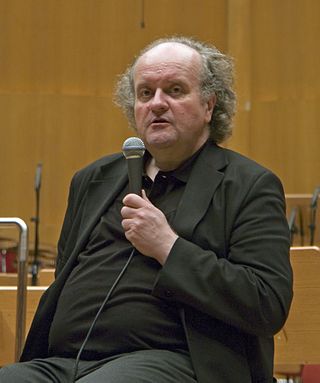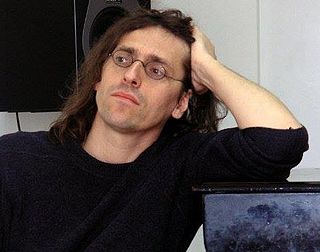Related Research Articles

Wolfgang Rihm was a German composer of contemporary classical music and an academic teacher based in Karlsruhe. He was an influential post-war European composer, as "one of the most original and independent musical voices" there, composing over 500 works including several operas.

Tabea Zimmermann is a German violist who has performed internationally, both as a soloist and a chamber musician. She has been artist in residence of the Concertgebouw Orchestra, the Berlin Philharmonic, and the Bavarian Radio Symphony Orchestra. In 2004, Zimmermann founded the Arcanto Quartet, a string quartet that performed until 2016. Several composers have written music for her, including György Ligeti, and she has made her own version of Bartók's Viola Concerto from the composer's sketches.

Toshio Hosokawa is a Japanese composer of contemporary classical music. He studied in Germany but returned to Japan, finding a personal style inspired by classical Japanese music and culture. He has composed operas, the oratorio Voiceless Voice in Hiroshima, and instrumental music.

Luca Belcastro is an Italian composer of classical music.
Traditionally a clarinet quintet is a chamber musical ensemble made up of one clarinet, plus the standard string quartet of two violins, one viola, and one cello. Now the term clarinet quintet can refer to five B♭ clarinets; four B♭ clarinets and a bass clarinet; three B♭ clarinets and two bass clarinets; one E♭ clarinet, two B♭ clarinets, and two bass clarinets; or one E♭ clarinet, two B♭ clarinets, one E♭ alto clarinet, and one bass clarinet. The term is also used to refer to a piece written for one of these ensembles.

The Rheingau Musik Festival (RMF) is an international summer music festival in Germany, founded in 1987. It is mostly for classical music, but includes other genres. Concerts take place at culturally important locations, such as Eberbach Abbey and Schloss Johannisberg, in the wine-growing Rheingau region between Wiesbaden and Lorch.
The Wittener Tage für neue Kammermusik is a music festival for contemporary chamber music, jointly organised by the town Witten in the Ruhr Area and the broadcasting station Westdeutscher Rundfunk (WDR). The concerts take place over a weekend at the end of April or in early May, and concentrate on world premieres of small-scale works, more than 600 as of 2010. They are broadcast worldwide via the European Broadcasting Union.

Jörg Widmann is a German composer, conductor and clarinetist. In 2023, Widmann was the third most performed living contemporary composer in the world. Formerly a clarinet and composition professor at the University of Music Freiburg, he is composition professor at the Barenboim–Said Akademie. His most important compositions are the concert overture Con brio, the opera Babylon, an oratorio Arche, Viola Concerto, Kantate and the trumpet concerto Towards Paradise. Widmann has written musical tributes to Classical and Romantic composers. He was awarded the Bavarian Maximilian Order for Science and Art in 2018 and the Bach Prize of the Free and Hanseatic City of Hamburg in 2023. He was Gewandhaus Composer of the Gewandhaus Orchester Leipzig and Composer in Residence for the Berlin Philharmonic.
Heinz Winbeck was a German composer, conductor and academic teacher. He is known for five large-scale symphonies, which he programmatically subtitled, such as "Tu Solus" and "De Profundis". As a composition teacher in Würzburg, he shaped a generation of students.

Carolin Widmann is a German classical violinist. She focuses on contemporary music. Widmann plays a violin made in 1782 by Giovanni Battista Guadagnini.
Margot Guilleaume was a German operatic soprano, a member of the Hamburg State Opera. She was an academic teacher at the Musikhochschule Hamburg from 1950 to 1978, and was known beyond Germany as a singer in oratorio and concert.
Dina Ugorskaja was a Soviet-born German pianist.

Wolfgang Boettcher was a German classical cellist and academic teacher. He was principal cellist of the Berlin Philharmonic, and a founding member of The 12 Cellists of the Berlin Philharmonic. From 1976, he was professor at the Hochschule für Musik Berlin. From 1986 to 1992 he was artistic director of the Sommerliche Musiktage Hitzacker chamber music festival.
Tatjana Masurenko is a German violist of Russian descent.
The Belmont Prize is a music award named after the place of destiny in Shakespeare's The Merchant of Venice. The Munich-based Forberg Schneider Foundation, founded in 1997, promotes outstanding achievements in the field of contemporary music. The biennially-awarded prize is endowed with €20,000 and is one of Europe’s highest endowed awards for artistic creation.
Michael Svoboda is an American composer and trombonist who lives and works in Switzerland.
Günter Ludwig was a German pianist.
Martin Christoph Redel is a German composer, music theorist, percussionist and university teacher.

Spannungen is an annual summer festival for chamber music in Heimbach, North Rhine-Westphalia, Germany, founded by pianist Lars Vogt in 1998. It is subtitled Musik im Kraftwerk Heimbach. Performances take place over one week in the power station Kraftwerk Heimbach. Many of the concerts with friends and colleagues were recorded live, broadcast by Deutschlandfunk and recorded for label Avi.
References
- 1 2 "Sommerliche Musiktage Hitzacker" (in German). Deutschlandfunk. 15 August 2010. Archived from the original on 2 August 2023. Retrieved 2 June 2017.
- ↑ "History". musiktage-hitzacker.de. 2017. Retrieved 2 June 2017.
- 1 2 "Sommerliche Musiktage Hitzacker 2016 / Von Haydn bis Django Reinhardt" (in German). Deutschlandfunk. 16 January 2017. Archived from the original on 1 March 2017. Retrieved 2 June 2017.
- ↑ "Flute Concerto" (PDF). Isang Yun. Boosey & Hawkes. 2017. Archived (PDF) from the original on 6 September 2015. Retrieved 2 June 2017.
- ↑ "Choralquartett / (2. Streichquartett) (2003, rev. 2006)". Jörg Widmann (in German). Schott Music. 2017. Archived from the original on 23 May 2017. Retrieved 2 June 2017.
- 1 2 3 "Intendant Wille: "Mozart zu spielen ist wie auf rohen Eiern zu laufen"". NDR.de (in German). 15 May 2023. Archived from the original on 25 July 2023. Retrieved 1 August 2023.
- ↑ "Musik - Hitzacker (Elbe) Neun Tage Mozart bei Sommerlichen Musiktagen Hitzacker". Süddeutsche.de (in German). dpa. 28 July 2023. Archived from the original on 29 July 2023. Retrieved 29 July 2023.
- 1 2 Weber, Bruno (2001). "Tonerlebnis / Musiktage Hitzacker 2001". neue musikzeitung (in German). Archived from the original on 16 November 2014. Retrieved 2 June 2017.
- ↑ Vries, Jutta de (2014). "69. Sommerliche Musiktage Hitzacker – durchgetanzt!". neue musikzeitung (in German). Archived from the original on 15 August 2014. Retrieved 2 June 2017.
- 1 2 "Kein fauler Zauber: Musik und Literatur / Zu den 57. Sommerlichen Musiktagen Hitzacker". neue musikzeitung (in German). 2002. Archived from the original on 16 November 2014. Retrieved 19 June 2017.
- ↑ Brem, Peter (2016). Ein Leben lang erste Geige: Meine Zeit bei den Berliner Philharmonikern (in German). Rowohlt. Archived from the original on 15 August 2014. Retrieved 19 June 2017.
- ↑ "Sommerliche Musiktage Hitzacker". Deutschlandfunk Kultur (in German). 15 August 2010. Retrieved 2 August 2023.
- ↑ "Nachklapp Hitzacker / Eine Festivalrückschau" (in German). Deutschlandfunk. 7 August 2006. Archived from the original on 2 August 2023. Retrieved 19 June 2017.
- ↑ "Sommerliche Musiktage Hitzacker / Gipfeltreffen zwischen Romantik und Gegenwart" (in German). Deutschlandfunk. 3 August 2007. Archived from the original on 2 August 2023. Retrieved 19 June 2017.
- ↑ "Pianist Formenti erhält Belmont-Preis" (in German). Augsburger Allgemeine. 26 July 2009. Archived from the original on 2 December 2021. Retrieved 19 June 2017.